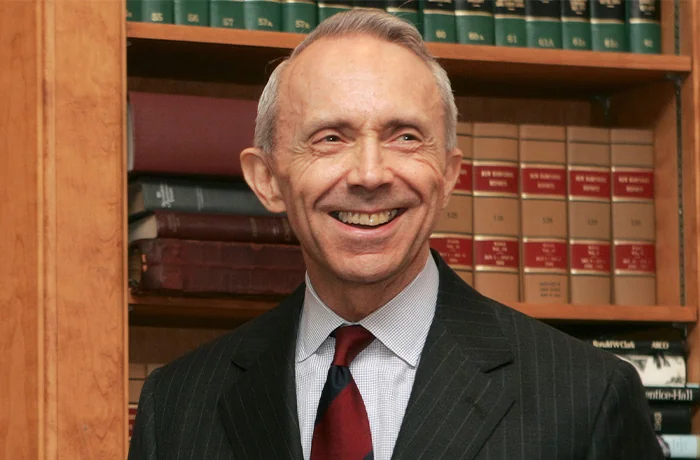In a world of grandstanding and gavels, David Souter was a whisper — a Granite State recluse who slipped onto the Supreme Court in 1990 like a shadow through a side door, only to leave an indelible mark on American law and the politics of judicial selection. Appointed by President George H.W. Bush, Souter, who died this month at his home in New Hampshire at 85, was the “stealth nominee” who confounded conservatives, delighted liberals, and taught Republicans a lesson they’d never forget: Vet your justices, or risk a legacy that veers left.
Born on Sept. 17, 1939, in Melrose, Massachusetts, David Hackett Souter was a New Englander through and through, raised in the rural hamlet of Weare, New Hampshire, where his family moved when he was 11. A bookish only child, he devoured history texts and hiked the White Mountains, cultivating a frugal, introspective life that would define him. At Concord High School, he was voted “most likely to succeed,” a prophecy fulfilled at Harvard University, where he graduated magna cum laude in 1961, and as a Rhodes Scholar at Oxford University. By 1966, he had his law degree from Harvard and returned to New Hampshire, joining a law firm in Concord. But private practice bored him. Public service beckoned.
Souter’s ascent was steady, unflashy, and quintessentially Yankee. In 1968, he joined the New Hampshire attorney general’s office, rising to deputy in 1971 and attorney general in 1976. He became a state Superior Court judge in 1978, then joined the New Hampshire Supreme Court in 1983. In 1990, Bush tapped him for the U.S. Court of Appeals for the 1st Circuit — a brief stopover before the big call came. When liberal lion Justice William J. Brennan Jr. retired that year, Bush, stung by the Senate’s rejection of Robert Bork in 1987, wanted a safe pick. Souter, little-known outside New England, seemed perfect. John Sununu, Bush’s chief of staff and a fellow New Hampshire Republican, called him a “home run for conservatives.” The Senate agreed, confirming him 90-9.

But Souter surprised. A jurist of restraint and a believer in precedent, his votes soon stunned the Right. In 1992, in Planned Parenthood v. Casey, he joined Justices Sandra Day O’Connor and Anthony Kennedy to uphold Roe v. Wade, arguing that overturning it “under fire” would “subvert the Court’s legitimacy beyond any serious question.” Conservatives said Souter betrayed them. His dissent in Bush v. Gore (2000), which halted Florida’s ballot recount and handed the presidency to George W. Bush, further alienated the GOP.
Souter’s drift to the Court’s liberal wing, on abortion, affirmative action, church-state separation, and gay rights, made him a darling of the Left but a cautionary tale for Republicans. His tenure sparked the cry of “No more Souters,” a mantra that reshaped how presidents pick justices. The Federalist Society, a conservative legal network, gained clout, ensuring nominees such as John Roberts and Samuel Alito had ironclad conservative credentials. Souter’s “stealth” status, with his scant paper trail, allowed him to slip through unvetted. After him, Republican nominees faced ideological litmus tests, a legacy that endures in today’s 6-3 conservative court. “In this important regard, Souter was a game-changer,” Yale Law professor Kate Stith noted.
Off the bench, Souter was an enigma. A lifelong bachelor, he shunned Washington’s cocktail circuit, calling it “the world’s worst city” for a man who preferred 18th-century history books to small talk. He lived in a spartan apartment, jogged alone, and lunched on yogurt and an apple at his desk. Each summer, he’d climb into his Volkswagen Jetta and drive home to his dilapidated Weare farmhouse, where his library sagged under the weight of his books. “I undergo an annual intellectual lobotomy,” he quipped of the court’s grueling term. Technology baffled him. He wrote opinions in longhand with a fountain pen, and he opposed cameras in the courtroom, fearing they’d politicize justice.
In 2009, at 69, Souter retired, younger than most justices, eager to reclaim his contemplative life. Then-President Barack Obama replaced him with Sonia Sotomayor, a New York liberal, preserving the court’s ideological balance. Souter returned to New Hampshire, serving part-time on the 1st Circuit Court of Appeals and championing civics education. In a 2012 interview, he warned that civic ignorance could erode democracy, presaging concerns about authoritarianism. “When problems get bad enough,” he said, “some one person will come forward and say, ‘Give me total power.’”
Souter’s death closes a chapter on a justice who prized duty over dogma and humility over hubris. Colleagues cherished his wit and warmth. Sotomayor treasured his “insightful” notes. Roberts praised his “uncommon wisdom and kindness.” Yet Souter, ever the recluse, requested no memorial, true to his belief that the work, not the man, should speak. Somewhere, in a New Hampshire attic, his fountain pen rests, its ink long dry, but its quiet strokes still echoing in the court’s hallowed halls — and in the GOP’s unyielding resolve to never misjudge a nominee again.
Daniel Ross Goodman is a Washington Examiner contributing writer and the author, most recently, of Soloveitchik’s Children: Irving Greenberg, David Hartman, Jonathan Sacks, and the Future of Jewish Theology in America.























